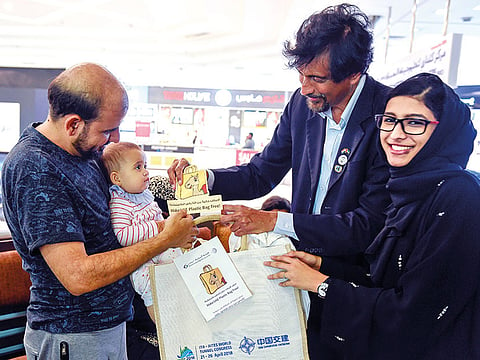Father-daughter duo do their bit for the environment
They distribute cotton bags on World Environment Day and work to save earth every day

Dubai: For father-daughter duo Najeeb Mohammad Esmail and Alisha, every day is Environment Day and every hour is Earth Hour.
Esmail and Alisha distributed reusable cotton bags on Tuesday to mark the World Environment Day outside a popular hypermarket in Al Ghusais. The occasion is the UN’s most important day and platform for “regular people” to take action on environment protection, specifically against plastic pollution that is this year’s theme.
“We are giving a lot of bags to people. This [plastic pollution] is a global issue. For any global issue, each of us can do a local action,” Esmail, from Kerala who is based in Dubai, told Gulf News.
Esmail has given around 600 cotton bags to residents over the last six years to encourage them to reduce consumption of disposable or single-use plastic.
“It allows for self-examination for people, for them to have that commitment that every time they say no to a plastic bag, they’re doing a great job to the world because per minute 10 million plastic bags are produced worldwide according to the UN,” he said. “Based on our observation, a person uses 15 bags on average when shopping every week. That’s 780 plastic bags a year for only one person,” Najeeb said.
But the problem, Esmail admitted, is that shifting to reusables require a shift in perspective and a change in habit.
“We have given hundreds of bags and they just take it and don’t use it. Now we give it and make sure they will use it hundreds of times,” he said.
Esmail encourages residents to keep a pencil or pen and tally the number of times they use the bags every week. The simple trick is an eye opener, he said.
The bags he and his daughter distribute are sourced responsibly as well — they are leftover cotton bags from exhibitors in Dubai.
Esmail said he uses his own money, time and life resources to drive home the message of sustainability and conservation in his circle of influence and even beyond.
His biggest influence is on his daughter, Alisha, who has seen her dad live out what he believed since she was a toddler.
“He has been trying to include all these practices into my life,” Alisha, now 18, also an eco-warrior, said.
“Because of my upbringing, I think I’m more aware of the consequences that happen when we use resources irresponsibly. The message is to stop following trends. Instead, create your own which can be for the good of the world and not just there for a short period of time” she added.
The father and daughter are also collecting aluminium foil, cans, and milk bottles from restaurants after iftar to divert them to resource recovery because “they are valuable resources given by God and we are just using it once without gratitude”.
Esmail describes what he’s doing as his “Individual Social Responsibility” or ISR, a concept he is trying to popularise.
“An individual can do hundreds of good deeds every day without taking permission or anything from anyone. Each and everyone of us can do hundreds of individual things. GDP for me is Good Deeds of People that can increase the GDP (Gross Domestic Product) of a country,” he said.
Use cotton bag 131 times
According to the Canadian-based allaboutbags.com, “to match the efficiency of using a plastic shopping bag just once”, residents must reuse each cotton bag 131 times to compensate for its large carbon footprint/global warming potential during manufacturing. Also, a word of caution, when using reusable cotton or jute bags, make sure to meticulously and regularly clean the bags to prevent cross-contamination, especially with perishables and meat products.



